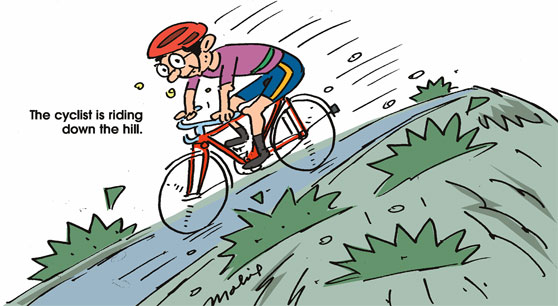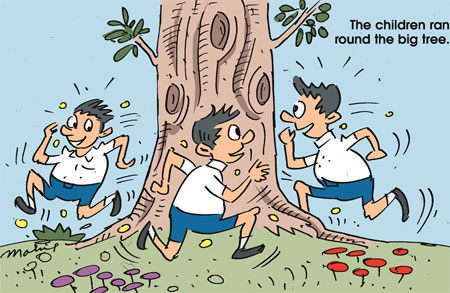|

by R. S. Karunaratne
Verbs ending with 's'
and 'ing'
We add 's' to the base form of the verb in the present tense when the
subject is singular. Similarly, we add 's' to the base form of the verb
when the subject is a pronoun ( he, she or it).
The cartoonist creates wonderful characters.
Nedra corrects her students whenever they make mistakes.

The lawyer handles many court cases in a week.
Kalyani wants to go for a drive in her new car.
The caterer specialises in Korean food.
He teaches me English.
She walks to school in the morning.
It wags its tail.
For uncountable nouns we add 's' to the base form of the verb.
Note: An uncountable noun refers to things that cannot be counted.
Eg. water, sugar, oil, ink, music or news.
Music soothes us when we are stressed.
Water flows under the bridge.
News travels quickly.
The jury needs more time to give a decision.
A collective noun refers to a group of people or things. It can take
either a singular or plural verb depending on the meaning. When we refer
to a group as a unit, we use a singular verb. We use a plural verb when
we focus on the members who make up the group.
The committee meets every weekday at the boardroom.
The committee are divided in their opinion.
When the subject is a noun phrase, we use a singular or plural verb
to agree with the head word.
The members' loyalty towards the chairman amazes everybody. (Here the
headword is 'loyalty.)
We use the base form of a verb with the 'ing' ending together with
the verb 'to be' in continuous tenses.
The driver is tooting the horn.
The dog is barking at the moon.
Some boys were exchanging blows.
The cyclist is riding down the hill.
The man with a gun was following a bear.
The tourists will be leaving for Delhi in 20 minutes.

The base form of a verb with the 'ing' ending is known as the present
participle. We use it after a noun to describe it.
The children studying in the classroom are intelligent.
The lecturer teaching us English is a graduate.
Note: The present participle is a non-finite verb. Therefore, the
sentence needs a finite verb. In the above sentences 'are' and 'is' are
finite verbs.
[Activity]
Underline the correct verbs and check your answers with the key.
1. The artist (creating / creates) wonderful scenes is a friend of
mine.
2. Lalin (drives / drive) his car to office everyday.
3. Mother and daughter (want / wants) to follow a cookery course.
4. We learnt English from a teacher (specialising / specialises) in
modern teaching methods.
5. Sayanora ( was drinking / drinks) a glass of milk when I entered her
room.
6. The oil ( protects / protect) your skin from the harsh rays of the
sun.
7. John ( antagonise / antagonises) his colleagues over minor issues.
8. The painting hung on the wall (enhance / enhances) the beauty of the
classroom.
9. The youth (running / run) along the road is a soldier.
10. Some people (scrutinise / scrutinises) the newspaper daily in search
of jobs.
Key:
1. creating 2. drives 3. want 4. specialising 5. was drinking 6.
protects 7. antagonises 8. enhances 9. running 10. scrutinise
Quiz on synonyms
A synonym is a word or phrase which has the same or nearly the same
meaning as another word or phrase.
The words 'small' and 'little' are synonyms. Match the synonyms in
column 'B' with the words in column 'A'. Check your answers with the
key.
Column A Column B
1. Accomplice A. control
2. Accomplish B. change
3. Accomplished C. devotee
4. Account D. enough
5. Accumulate E. able
6. Accurate F. discourse
7. Accuse G. calculation
8. Ache H. affix
9. Acknowledge I. alter
10. Acquire J. sharp
11. Acquit K. genuine
12. Acrimonious L. energetic
13. Act M. deed
14. Active N. harsh
15. Actual O. absolve
16. Acute P. obtain
17. Adapt Q. accept
18. Add R. pain
19. Addition S. blame
20. Address T. exact
21. Adept U. amass
22. Adequate V. description
23. Adherent W. skilful
24. Adjust X. achieve
25. Administer Y. abettor
Key:
1. Y
2. X
3. W
4. V
5. U
6. T
7. S
8. R
9. Q
10. P
11. O
12. N
13. M
14. L
15. K
16. J.
17. I
18. H
19. G
20, F
21. E
22. D
23. C
24. B
25. A
Starters:
How to use prepositions
[Part 21]
There are over 100 prepositions in English. This is a very small
number compared with the vast number of nouns, verbs and adjectives
However, most beginners find it difficult to use prepositions correctly.
The following is a guide for them.
Per
We use the preposition 'per' to indicate rates, ratios, measurements and
prices.
The car was driven at 100 kilometres per hour.

The dinner will cost Rs 500 per person.
Plus
We use the preposition 'plus' to mention additional things or amount.
The rent will be Rs 10,000 a month, plus water and electricity charges.
Preparatory to
We do certain things 'preparatory to' doing something else.
She drank a glass water preparatory to addressing the large gathering.
Prior to
If something happens 'prior to' a particular event, it happens before
that event.
The author published a novel two weeks prior to his death.
You have to edit the manuscript prior to publication.
Regarding
We use the preposition 'regarding' to indicate the subject matter of
something that is said, written or thought.
The company wants some information regarding the candidate's character.
There is some confusion regarding the new lecturer's qualifications.
Note: 'Regarding' is never followed by 'to.'
I am writing regarding your letter sent to me last week.
Regardless of
The preposition 'regardless of' means 'despite.'
The building of a new tourist hotel is going ahead regardless of local
opposition.
Some jobs are open to all regardless of age.
Round
The preposition 'round' means 'in a circular direction.'
'Around' is used mainly in American English.
The earth moves round the sun.
The children ran round the big tree.
Mother put her arms round her daughter.
Large crowds gather round politicians.
If there is a way round a problem, there is a solution to it.
If you think hard, you can find a way round the difficulty.
Save
The preposition 'save' means 'but' or 'except for.'
The divers found all the bodies save one.
Since
The preposition 'since' means 'from a particular time in the past until
a later time, or until now.'
We have lived here since 1990.
Than
The preposition 'than' is used to join two parts of a comparison.
My son is a bit taller than you.
Sandra came earlier than usual.
Through
The preposition 'through' means 'from one end of something to the
other.'
The soldiers walked through the jungle.
The children waded through the water to reach the classroom.
Her harsh words keep running through my mind.
The train sped through the tunnel.
I'll put you through to the circulation department.
We usually work through Monday to Friday.
[Activity]
Fill in the blanks with suitable prepositions. Check your answers
with the key.
1. She has thousands of pairs ........ shoes.
2. She was known .......... her obsession ......... shoes.
3. Invest your money wisely ....... purchasing the right shoes.
4. She studied ........... Musaeus College.
5. My biggest plan is ....... spend time ........ my son.
6. I am open ......... change.
7. He was not confined ......... one style of music.
8. "I never wanted..... glorify myself," he said.
9. Most men do not have the skill .... select good fabrics.
10. Reading the reviews I felt the film would harm our industry
........... two ways.
Key:
1. of 2. for, with 3. in 4. at 5. to, with 6. to 7. to 8. to 9. to
10. in
Form adjectives from nouns
Words often come in families. You can expand your vocabulary by
becoming familiar with these word families.
In the following quiz we give you 25 nouns in Column 'A'. Write the
relevant adjectives for each noun in Column 'B' and check your answers
with the key
Column A Column B
1. Publisher .............
2. Punishment .............
3. Purity .............
4. Purpose .............
5. Push .............
6. Qualification .............
7. Quarter .............
8. Question .............
9. Quiet .............
10. Race .............
11. Rate .............
12. Reaction .............
13. Reading .............
14. Readiness .............
15. Realism .............
16. Reason .............
17. Reception .............
18. Recognition .............
19. Record .............
20. Reflection .............
21. Regret .............
22. Regularity .............
23. Relation .............
24. Relaxation .............
25. Reliability .............
Key:
1. published
2. punishable
3. pure
4. purposeful
5. pushy
6. qualified
7. quarterly
8. questionable
9. quiet
10. racial
11. overrated
12. reactionary
13. readable
14. ready
15. real
16. reasonable
17. receptive
18. recognisable
19. recorded
20. reflective
21. regrettable
22. regular
23. related
24. relaxed
25. reliable |


